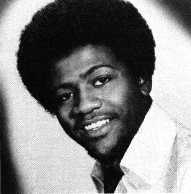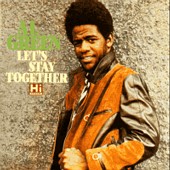|
In the early sixties, Al and a couple of friends formed the Creations, which played the "chitlin circuit" in the Midwest. Then, in 1967, group member Palmer Jones persuaded Al to record a song he had written, titled "Back Up Train." The single was released on Hot Line Records, a small independent label, and Al was an overnight success -- but without a follow-up, it didn't last long. While playing a small club in Midland, Texas, Al met Willie Mitchell, a pianist who had backed dozens of performers on record. Since 1964, he'd fronted his own instrumental combo, churning out a string of mild-selling funk singles for Hi Records in Memphis. In Al, Willie felt he'd found the perfect vocal counterpart to his own taut, seductive rhythm. He guaranteed that he could make Al a star in a couple of years. Exactly two years later, in 1971, the first hit came along -- "Tired of Being Alone." It some more than a million copies.
The follow-up single was "Let's Stay Together," a carefully plotted blues record, despite its live, almost stream-of-consciousness feel. Al's vocal style was deliberately underplayed, generating a sensual, almost hypnotic emotional tension. The rhythm behind him was controlled and edged with tension -- the ideal backdrop for sudden yet perfectly timed bursts of falsetto. It was soul with a twist -- painfully sweet, not at all gruff like the music of many of his predecessors. "Let's Stay Together" broke onto the national charts early in December 1971 and slowly rose to the number-one spot, which it occupied in mid-February 1972. It sold more than three million copies and was the number-one single of the year in the 1972 Cashbox polls, as well as top soul song of the year according to Billboard. Al quickly followed it with three more Top 5 hits in a row: "Look What You Done for Me," "I'm Still in Love with You," and "You Ought to Be with Me." In all, Al sold ten million "units" in 1972, and he closed out the year by being named the Top Male Singer of 1972, at the Second Annual Soul and Blues Night, held in L.A.
Besides musical waves, Al Green made headlines on October 18, 1974, when a girlfriend, Mary E. Woodson, poured a pot of boiling grits over Al as he was getting out of his bathtub, because he refused her proposal of marriage. A few minutes later, she committed suicide. Al recovered physically from his second-degree burns, but the tragedy left deep emotional scars and apparently triggered a spiritual crisis in the singer. "The Prince of Love" was one of a number of nicknames that Al picked up during his career; others included "the mean Al Green," "Green Power," "the lean Al Green," and "the Soul Doctor." But in 1976 he acquired the title he cherishes the most -- "the reverend Al Green." He entered the ministry, and opened his own nondenominational church in Memphis, the Full Gospel Tabernacle. But Al did not, however, give up his pop career, and he preached at his church only when he was not on tour. His records continued to place regularly on the R&B chart and occasionally on the pop chart. During a 1979 concert in Cincinnati, Al fell of the stage and narrowly escaped serious injury. He considered the incident a warning from God and for a time thereafter, his public appearances were limited to religious services in churches around the United States, where he both sang and preached. Al's records of the eighties contained only religious songs, both standard hymns and his own originals, in a style that mixed Memphis soul with gospel. In 1992 he signed a new deal with BMG Records and returned to the Memphis soul sound of his roots with Don't Look Back. Two years later Al duetted with Lyle Lovett on the Grammy-winning "Funny How Time Slips Away" for Rhythm, Country, and Blues, a collection of duets that teamed up well-known artists in each of these fields. Willie Mitchell, who also helped guide the career of Ann Peebles in the 1970s, stayed busy even in his later years, working with newcomers like John Mayer and Anthony Hamilton. He died on Jan. 5, 2010, at Methodist University Hospital in Memphis, Tenn., after suffering cardiac arrest. He was 81.
No comments so far, be the first to comment. |


